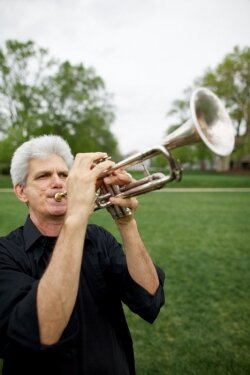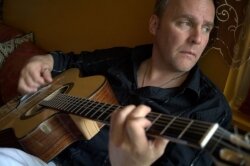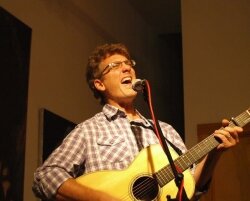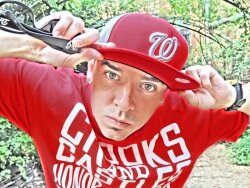Good vibrations: Music heavies weigh-in on the scene
-
 "This town has always been extraordinarily open to musicians of all kinds," says jazz trumpeter John D'earth, who also teaches jazz at UVA. "That's why I moved here in the mid-1980s."Tom Daly
"This town has always been extraordinarily open to musicians of all kinds," says jazz trumpeter John D'earth, who also teaches jazz at UVA. "That's why I moved here in the mid-1980s."Tom Daly -
 "Charlottesville has an incredible amount of musicians and bands doing some very interesting things, not to mention all the variety," says virtuoso guitarist Rick Olivarez, who's group the Olivarez Trio channels Django Reinhardt on Tuesday nights at the C & O.Courtesy of the artist
"Charlottesville has an incredible amount of musicians and bands doing some very interesting things, not to mention all the variety," says virtuoso guitarist Rick Olivarez, who's group the Olivarez Trio channels Django Reinhardt on Tuesday nights at the C & O.Courtesy of the artist -
 "Music in Charlottesville is exciting right now," says Tucker Rogers, a guitarist and long-time friend and collaborator with William Walter & Co. "It's a breeding ground for creativity."courtesy the artist
"Music in Charlottesville is exciting right now," says Tucker Rogers, a guitarist and long-time friend and collaborator with William Walter & Co. "It's a breeding ground for creativity."courtesy the artist -
 "I feel extremely positive about the local and regional music scene," says Jeyon Falsini, who owns Magnus Music, an artist/venue booking agency he started in 2007.Courtesy Jayon Falsini
"I feel extremely positive about the local and regional music scene," says Jeyon Falsini, who owns Magnus Music, an artist/venue booking agency he started in 2007.Courtesy Jayon Falsini -
 "There are lots of pretty talented folks starting to work together, and getting a good recording done has never been easier," says guitarist Rusty Spiedel. "There also seems to be a real explosion of local 'venues' lately-- coffee houses, wineries, breweries, and smaller restaurants hosting solo and duo artists."Courtesy Rusty Spiedel
"There are lots of pretty talented folks starting to work together, and getting a good recording done has never been easier," says guitarist Rusty Spiedel. "There also seems to be a real explosion of local 'venues' lately-- coffee houses, wineries, breweries, and smaller restaurants hosting solo and duo artists."Courtesy Rusty Spiedel -
 "Charlottesville flourishes with hip-hop," says rapper Bo Littlejohn, "but the community is a little sheltered from that scene, so we just don't have the exposure or the venues."courtesy the artist
"Charlottesville flourishes with hip-hop," says rapper Bo Littlejohn, "but the community is a little sheltered from that scene, so we just don't have the exposure or the venues."courtesy the artist
"Vibrant," appropriately enough, is the word many local musicians the Hook spoke to used to describe the local music scene these days.
"Charlottesville has an incredible amount of musicians and bands doing some very interesting things, not to mention all the variety," says virtuoso guitarist Rick Olivarez, whose group, the Olivarez Trio, channels jazz guitar pioneer Django Reinhardt on Tuesday nights at the C&O Restaurant. "We're not just an indie town or an Americana town. We have great classical concerts, both western and Indian, and who knows what you'll see at The Twisted Branch [Tea Bazaar] or C'ville Coffee. Plus, of course, we have John D'earth."
Indeed, D'earth, the well-known jazz trumpet player who graces our cover this week, could be described as the musical mentor of mentors in Charlottesville, and his musical ambitions extend far beyond preparing for his regular Thursday night gigs at Miller's.
"This town has always been extraordinarily open to musicians of all kinds," says D'earth, who also teaches jazz at UVA. "That's why I moved here in the mid-1980s."
Now that we've produced the Dave Matthews Band, D'earth says, people tend to think of Charlottesville as a "music powerhouse."
"And that's true to some extent," says D'earth, "but we've got a lot of work to do to make it better. Nothing lights up more parts of the brain than music. Music is good for people, good for individual health
and the community, and we need to make sure that everyone has access to it."
More on D'earth's thoughts about the work we need to do a little later.
Relative to other musical eras in Charlottesville, Rapture owner Mike Rodi, once a force in the local music scene and beyond with his former band Clare Quilty, says the current music scene is pretty strong.
"At Rapture we have live bands every Monday and Wednesday, and many, many Thursdays, Fridays, and Saturdays as well," he says. "Local bands are connecting somewhat successfully with their audience, which to me is a good indicator. We're also seeing some nearby markets, most notably Richmond, transplant their 'scenes' here."
More importantly, Rodi says he's seen bands here build pretty loyal and substantial followings, such as Kings of Belmont and Larissa and the Lusionistics. Monday nights at Rapture this year with Dane Alderson, the well-known Australian bassist who's doing an extended stay in Charlottesville, have drawn all kinds of local musicians out of the woodwork to collaborate with him and pack the house.
Indeed, a reporter stumbled into Rapture one night to listen to Alive in the Superunkown, a local '90s cover band, and they blew him away.
"A cover band, true, but a damn fun one," says Rodi of Superunknown. "They crush it consistently, same for Love Cannon. Recently, Guerrilla Tactics Do the Gorillaz packed the house and put on a nearly perfect show.
"As a venue owner, I'm definitely seeing some popular support for a lot of acts," says Rodi. "More so than in the past."
"I feel extremely positive about the local and regional music scene," says Jeyon Falsini, who owns Magnus Music, an artist/venue booking agency he started in 2007. Falsini helped usher Love Cannon into the local scene by fostering their regular gigs at Rapture, plus he helps round out the musical calendars at the Box, Rapture, and the Whiskey Jar.
"I average about 10 shows a week in all these spots combined," he says, "and it allows me a unique vantage point to meet and help foster the growth of local and regional musical talent."
Over at WTJU, the folk and roots scene has a much-needed advocate in Peter Jones, its folk director. Jones is currently involved in trying to bring back the famed Prism Coffeehouse, and he says the Prism Board is now working in collaboration with the Haven on Market Street to be able to use the Sanctuary space in the old church there.
"This is in no small part because of the dearth of locations for good folk and roots music in the area," says Jones. "While the Southern and Jefferson do some folk-oriented concerts, most acts that would routinely have been at the Prism, and then for a few years at the Mockingbird in Staunton, are now having to perform at house concerts. While house concerts are a nice way to see acts, many of the artists are more deserving of a true venue with larger seating capacity."
"Music in Charlottesville is exciting right now," says Tucker Rogers, a guitarist and long-time friend and collaborator of William Walter & Co., who've been wowing festival goers for some time with their special high-energy, "funky twang" rock and roll. Rogers, who moved here in 1999 drawn by the city's musical reputation, says that Charlottesville has always been a "breeding ground for creativity."
"It feels like there's a vehicle in place, in the city's consciousness, now, that new artists, old artists, serious artists, and casual artists can use to get their ideas across or just to perform," he says. "That must be a product of growth in the city in general, but I know artists who moved here for the very same reason as me, and now we're all contributing."
Rusty Spiedel, a guitarist and founding member of Spiedel Goodrich Goggin and Lille (better known as SGG&L), who now plays with up-and-coming singer-songwriter Ashley McMillen, echos that enthusiasm for the local music scene.
"There are lots of pretty talented folks starting to work together, and getting a good recording done has never been easier," he says. "There also seems to be a real explosion of local 'venues' lately– coffee houses, wineries, breweries, and smaller restaurants hosting solo and duo artists."
Still, as musicians will also tell you, its not all rainbows and lollipops.
"The challenge these days," says Spiedel, "is finding viable ways to make a go of it as a career, even a mild one. It's hard to get regular gigs and build a legit audience, and any dreams of stringing together any real success have to include hitting the road. And the pay is dismal. I see cover charges now that are less that we charged in the 80s– $5-7 in most places. Hard to make ends meet on that."
D'earth would agree, and on the heels of that he mentions an even bigger challenge.
"There's a big racial divide in this town," he says, "and we need to keep working to break down these barriers, to make sure that there are ways that people, especially young people, of all racial and socioeconomic backgrounds, can interact."
Indeed, Bo Littlejohn, a.k.a Bizeee, a local rapper, producer, and DJ at WNRN's Boombox show, thinks hip-hop is one of the biggest genres of music in Charlottesville right now, and the least known about. Indeed, Littlejohn says there are about 70 acts working in town, 20 of whom he represents.
"Charlottesville flourishes with hip-hop," says Littlejohn, "but the community is a little sheltered from that scene, so we just don't have the exposure or the venues."
"Musicians should be together," says D'earth, "they need to cross-pollinate, and so I think the whole community needs to be involved in this."
Fortunately, says Littlejohn, the Annex just opened on the Water Street side of the ice park, a small venue putting on weekend hip-hop shows.
"It's a wonderful scene, and the Music Resource Center has been great," he says, "but we need a lot more exposure. We need help."
Then, of course, there's that 800-pound music business gorilla in the room that every local musician is aware of, whether they admit it or not: Red Light Management, the artist management company founded by Dave Matthews Band manager Coran Capshaw, who also owns Charlottesville's most prominent music venues, the nTelos Wireless Pavilion and the Jefferson Theater.
"Sometimes it's a real bummer to have Red Light here," admits Spiedel, "because it provides false hope for many."
Indeed, what local musician or band hasn't dreamed of repeating what Dave Matthews did? Grabbing up a bunch of great local musicians, forming a band, getting a regular local gig, then taking over the world.
"Red Lights' proximity means that many fledgling artists see 'getting signed by Red Light' as a great option and somehow potentially easier because they are a local company," says Spiedel. "I think good management should be a primary goal of any aspiring musician, but assuming it's going to be them just because they're in C'ville is probably a bit optimistic."
Spiedel also thinks that Red Light owning all the venues here has actually made being heard in C'ville a little tougher because they promote national acts. "That's why I think these small coffee house gigs and a vibrant house concert community are springing up," he says.
"Don't get me wrong," Spiedel adds, "Fridays After Five is a great local artist showcase, and Kirby [Hutto, the Pavilion manager] does a great job with that, but it's hard as a local artist to get any real traction
here."
Indeed, Spiedel and McMillen have Hutto to thank for getting them on the bill with country singer Gary Allan at his June 27 Pavilion show. But as Hutto points out, while Fridays After Five is made up of mostly local or regional acts, getting locals on the stage with national touring acts isn't easy.
"The national touring acts usually come as a package," says Hutto. "With Ashley, Allan just happened to have an opening, and she was the right fit for his audience, but those opportunities don't come along that often."
As for the Jefferson Theater, Hutto says its actually easier for local acts to get on the stage there because some of the names aren't quite as big, and often times they've combined a few local acts for a bill they think will draw an audience.
Hutto also has some advice for local musicians hoping to share the stage with some of the big acts that roll through town.
"If you ever want that opportunity," he says, "you have to have a professional website. Its very hard to get approved on the national scene without that. That's the world today; it's all about having that online presence."
Of course, not everyone expresses concern for the national touring acts stealing our local thunder. Rogers, for instance, says he gets inspired as a musician by all the national acts that roll through town.
"It feels as if local artists play up to the level, so to speak, for themselves, as they see nationally touring bands come through and excite audiences," he says, "and provide more diversity to the musical landscape."
However, on a philosophical level, Spiedel wonders if Red Light's presence here gives the community a false sense of its own influence.
"There are some talented artists here, for sure," he says, "But this is hardly the center of the musical universe."
Indeed, while our music scene is vibrant, diverse, and loaded with talent, is it still possible for a local band to break out here, to build a following big enough to launch them to the next level?
"I don't know," says Spiedel, "the model Dave (Matthews) followed has yet to be repeated since."
D'earth is more succinct. "We won't see that again any time soon," he says.
Olivarez, one of the most sincere aesthetes you're likely to meet, says he's not too concerned about that stuff.
"I'm not a fan of 'scenes' becoming more important than the music itself," Olivarez says, "where people go to see and be seen and have no care about the art being created.
"I don't think I would be too thrilled if there was a so-called 'Charlottesville music scene,'" he says. "Just look what happened to the Seattle, Chapel Hill, and Austin scenes. In the end, I think it's probably best to just go out and support some live music."
So, yeah, let's keep it real, people.
7 comments
Someone needs to reopen the Mockingbird. Such a great venue, and it always seemed to be thriving when I was there. I still can't believe it closed.
Perhaps the author or editor could explain why there isn't a single female source in this story? It's certainly not for a lack of female musicians.
Don't feel bad, Liz. It's also only white guys.....
ridiculous article
The under- (almost non-)representation of women and people of color in this article is indeed a shame. And highly ironic, considering the racism in the local scene D'Earth rightly points out. Even Bizeee, the representative of Cville's (vibrant, but marginalized) hip-hop scene, appears to be light-skinned (white?). Predictable over-emphasis on rock & jazz (the boys' turf, of course, and the most visible musics in Cville), but no attention to pop, experimental, or electronic dance music. Where's The Bridge? Melody Supreme? WTJU? And what's with the sidebar touting visits by Yes and Taylor Swift doing in an article ostensibly about local music? No wonder Charlottesville's local music scene doesn't get much national attention when even our local reporters can't take it seriously.
Good article. I've always loved C'ville's music scene since I lived there 68-74. I get back whenever I can. I moved to Austin in 74 so I had to laugh at the pejorative comment about the "scene" here. As a fervent music lover I live in an amazing city. I look forward to hearing some great music the next time I'm up your way.
My special congratulations to the editor who let the print edition out of the door, which claims this to be the '2012 Music Special Issue'. Also, not everyone who can strum a guitar or force air into a microphone deserves 'a shot'. Some people are not viable music acts, and they should discover that sooner rather than later.